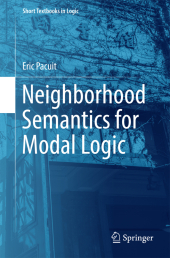 Neuerscheinungen 2017Stand: 2020-02-01 |
Schnellsuche
ISBN/Stichwort/Autor
|
Herderstraße 10
10625 Berlin
Tel.: 030 315 714 16
Fax 030 315 714 14
info@buchspektrum.de |

Eric Pacuit
Neighborhood Semantics for Modal Logic
1st ed. 2017. 2017. xii, 154 S. 17 SW-Abb. 235 mm
Verlag/Jahr: SPRINGER, BERLIN; SPRINGER INTERNATIONAL PUBLISHING 2017
ISBN: 3-319-67148-0 (3319671480)
Neue ISBN: 978-3-319-67148-2 (9783319671482)
Preis und Lieferzeit: Bitte klicken
This book offers a state-of-the-art introduction to the basic techniques and results of neighborhood semantics for modal logic. In addition to presenting the relevant technical background, it highlights both the pitfalls and potential uses of neighborhood models - an interesting class of mathematical structures that were originally introduced to provide a semantics for weak systems of modal logic (the so-called non-normal modal logics).
In addition, the book discusses a broad range of topics, including standard modal logic results (i.e., completeness, decidability and definability); bisimulations for neighborhood models and other model-theoretic constructions; comparisons with other semantics for modal logic (e.g., relational models, topological models, plausibility models); neighborhood semantics for first-order modal logic, applications in game theory (coalitional logic and game logic); applications in epistemic logic (logics of evidence and belief); and non-normal modal logics with dynamic modalities.
The book can be used as the primary text for seminars on philosophical logic focused on non-normal modal logics; as a supplemental text for courses on modal logic, logic in AI, or philosophical logic (either at the undergraduate or graduate level); or as the primary source for researchers interested in learning about the uses of neighborhood semantics in philosophical logic and game theory.
1. Introduction and Motivation 1.1 Subset Spaces 1.2 Language and Semantics 1.3 Why Non-Normal Modal Logic? 1.4 Why Neighborhood Structures? 2. Core Theory 2.1 Expressive Power and Invariance 2.2 Alternative Semantics for Non-Normal Modal Logic 2.3 The Landscape of Non-Normal Modal Logic 2.4 Computational Issues 2.5 Frame Correspondence 2.6 Translations 3. Richer Languages 3.1 Universal Modality and Nominals 3.2 First-Order Neighborhood Structures 3.3 Common Belief on Neighborhood Structures 3.4 Dynamics with Neighborhoods: Game Logic 3.5 Dynamics on Neighborhood Structures A. Relational Semantics for Modal Logic A.1 Definability A.2 Normal Modal Logics
"Neighbourhood frames offer an interpretation to systems of modal logic that generalises the more traditional relational frames. ... Complemented with the numerous pointers to the literature that it provides, the book will be a valuable source of information and practice for PhD students." (Éric Martin, zbMATH 1390.03001, 2018)
"Reading and writing a review of this wonderful book has been a pleasure. Knowing the basics of propositional modal logic may explain why I enjoyed reading it. The author has gathered and surveyed many papers in writing this book. This is a must-read for those who want to do research on neighborhood semantics--after having acquired a basic knowledge of modal logic." (Manoj K. Raut, Computing Reviews, February, 2019)
Eric Pacuit is an Assistant Professor of Philosophy at the University of Maryland, USA. Before coming to Maryland, Eric worked at Stanford University, USA; at the Institute for Logic, Language and Computation at the University of Amsterdam, Netherlands; and at the Tilburg Institute for Logic and Philosophy of Science at Tilburg University, Netherlands. His research primarily addresses issues in interactive epistemology and group decision-making - two interdisciplinary areas that make use of ideas and techniques from logic (especially modal logic), philosophy, game theory and social choice theory. His research has been generously supported by a grant from the National Science Foundation and a VIDI grant from the NWO (the Netherlands Organization for Scientific Research).


